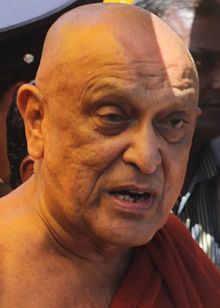Maduluwawe Sobitha Thero
| Ven. Maduluwawe Sobitha Thero | |
|---|---|
| පූජ්ය මාදුළුවාවේ සෝභිත හිමි | |

Sobitha Thero in 2015.
|
|
| Religion | Buddhism |
| School | Theravada |
| Lineage | Siam Sect |
| Temple | Kotte Naga Vihara |
| Alma mater |
Vidyalankara Pirivena University of Sri Jayewardenepura |
| Dharma names | Ven. Maduluwawe Sobitha Thero |
| Personal | |
| Nationality |
|
| Born |
Pathirage Don Rathnasekara 29 May 1942 Padukka, Sri Lanka |
| Died | 6 November 2015 (aged 73) Mount Elizabeth Hospital, Singapore |
| Cause of death | Complications from Heart Surgery |
| Parents |
Pathirage Don Peiris Appuhamy (Father) Kuruwita Arachchige Karalinahami (Mother) |
| Senior posting | |
| Title | Chief Incumbent of the Kotte Naga Vihara |
Maduluwawe Sobitha Thero (Sinhalese: මාදුළුවාවේ සෝභිත හිමි; 29 May 1942 – 6 November 2015) was an influential Sinhalese Buddhist monk regarded by many, a nonviolent revolutionary. The chief incumbent of the Kotte Naga Vihara, he was a prominent socialist and social justice activist who led campaigns that toppled governments.
The Thero was born on 29 May 1942, the Vesak day from the village of Maduluwewa in Padukka, Homagama as Pathirage Don Rathnasekara. He received his primary education at Maduluwawe Maha Vidyalaya and entered the Buddhist temple life at the age of 11 in Padukka, under the guidance of his uncle, the head monk. He was ordained a novice monk on 9 May 1955 at the Kotte Sri Naga Viharaya. In 1962, the Thero received his higher ordination after studying at the Vidyodaya and Vidyalankara Pirivenas and received his honorary doctorate from the University of Sri Jayewardenepura in 1964. In 1967, the Thero became the chief incumbent of the Kotte Naga Viharaya.
The Thero came to prominence during his struggle against then-President J. R. Jayewardene (in office: 1977-1988) and the latter's efforts to centralize power within the presidency, and threats against freedom of expression, civil rights and the rule of law. Thero was one of the most important leaders of the anti-Indian intervention campaign in the late 1980s as well. He was an excellent orator in mobilizing the Sri Lankan populace across the spectrum. He put his charisma, influence and skill to maximum use in the fight through the National Movement for a Just Society (NMJS) to usher in a democratic government on 8 January 2015 by uniting a divided opposition and the trade unions, rights groups, artists, professionals and academia.
Sobitha Thero played a key role in bringing a new government to power in 2015 by defeating Mahinda Rajapaksa. He supported the common candidate Maithripala Sirisena for the presidency, and Ranil Wickremesinghe to form a new government and campaigned for the release of Sarath Fonseka. The Thero was an ardent campaigner against the executive presidential system of Sri Lanka and acquired a reputation for his stand on social justice and for educating the youth on the dangers of drugs and alcohol abuse. He promoted mutual respect and amity between the various religious and linguistic groups of the country. The Thero died on 6 November 2015 at the Mount Elizabeth Hospital in Singapore. He was 73 at the time of his death. The government announced a state funeral and a day of national mourning.
...
Wikipedia
